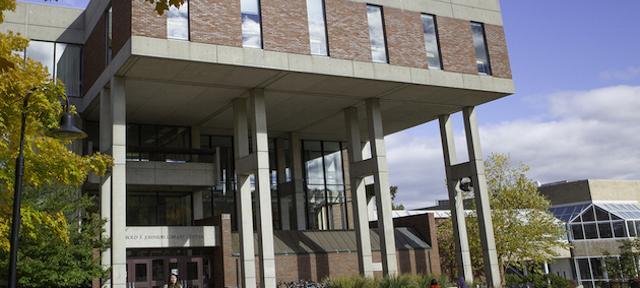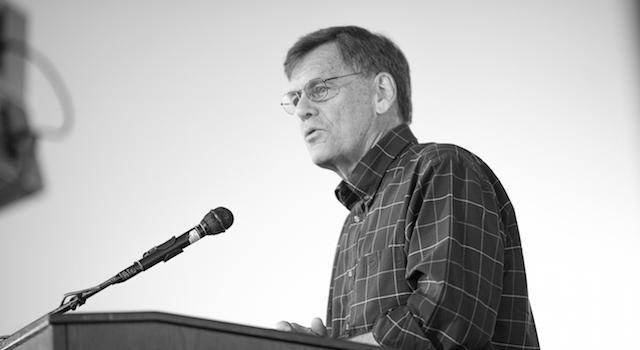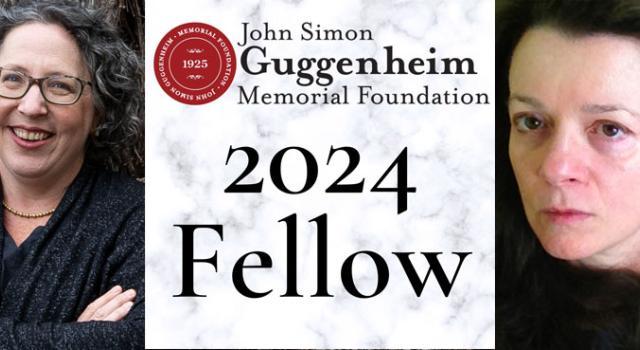Mellon Grant of $1.2 Million Funds Reinvention of Hampshire Library

Hampshire’s leaders are invoking the spirit of experimentation that founded the College as they launch a far-reaching initiative to establish the library as the hub of campus learning, a re-imagined space where students can create their projects from concept through collaboration to completion. And a major foundation has endorsed the plan by awarding the College a $1.2 million grant to fund it, enabling Hampshire to pilot a model that promises to benefit other academic libraries.
Hampshire has earned the generous, seven-figure grant from The Andrew W. Mellon Foundation in response to the College’s proposal, titled Learning Commons 3.0, for the reinvention of the Harold F. Johnson Library. Hampshire’s project team will utilize the funds to develop service models and to modernize and transform the library into an integrated hub of content, tools, and services in support of the College’s curriculum.
The plan promises to result in a prototype that benefits libraries throughout the Five Colleges and beyond, creating a model for modern academic and technological requirements. “Our efforts will provide our consortium colleges and the broader higher ed community with an example and a process for the continued transformation of the role of the library in education,” said Library Director Jennifer King.
The initiative is the result of more than two years of planning by a 15-member steering committee comprising faculty, students, and staff and chaired by King, an effort funded by a 2014 Mellon grant of $65,000. Using a thorough process involving extensive interviews of a range of constituents, the committee identified priorities for its learning-commons proposal:
- A range of academic support services will be brought together from offices across campus to reside alongside the research librarians and their instructional technology;
- New workspaces will be created to be open, collaborative, flexible, and technology-rich;
- Maker-space labs will be strengthened and expanded; and
- Hampshire’s current peer-mentoring process will be enhanced with a strong training component and extended across the curriculum, broadening the library’s capacity and expanding student involvement in delivery of services.
Unfolding over four years and involving several stages, the plan will strengthen many existing services and resources, and help guarantee a prominent future for a reimagined facility.
“I think it’s the most exciting new initiative on campus,” said committee member Laura Wenk, dean of Curriculum and Assessment, associate professor of cognition and education, and codirector of the Center for Teaching and Learning. “The new structure will support the whole work arc of student projects. Conceptualizing, collaborating, publishing, and sharing work—all of that should happen in this new space. This will make student work more visible as they work more and share more in the library, and make connections with other students, faculty, and staff there. It will no doubt affect how students feel about their college experience.”
Under the new model, the Harold F. Johnson Library will offer services alongside Information Technology, the Creativity Center, and the following academic support programs: the Writing Center, the Transformative Speaking Program, the Quantitative Resource Center, the Center for Teaching and Learning, and the Center for Academic Support and Advising. At present these programs serve students independently and from offices across campus.
According to the Steering Committee’s proposal, the library’s transformation promises to measurably increase student satisfaction, success, and retention. King and the other committee members have expressed deep appreciation to The Andrew W. Mellon Foundation for funding their proposal and validating their vision.
Through its program in Higher Education and Scholarship in the Humanities, The Andrew W. Mellon Foundation assists select colleges, universities, and research institutes in the work of training educators and producing scholarship. A focus of its grant funding is to support initiatives designed to enhance the learning experience of both undergraduate and graduate students in the humanities, and fostering collaborations within and among institutions.
Laura Wenk commends the work of King as the Steering Committee’s chair and of the committee as a whole: “We met with staff at other institutions and they told us they wish they had ways to involve the campus in decisions the way we have, with less bureaucracy and less pressure from the top,” said Wenk. “Our Steering Committee worked with the whole campus to think about how people use the library and the ways in which services could be brought together to meet user needs.
“This project shows what you can accomplish when you conduct the planning in this way,” she said, “listening to and considering the needs of the real users of the space and services.”
HONORING A FOUNDING VISION
King said the vision for the proposal brings Hampshire back full circle to its founding, innovative library plan even as it looks to the future. “We’ll return the library to its originally intended role as the ‘nerve center’ of the College,” she said, “and continue to explore and develop an active role for the library in teaching and learning.”
When Hampshire was formed, in the 1960s, by leaders of our sister schools—Amherst College, Mount Holyoke College, Smith College, and the University of Massachusetts Amherst—the expectation was that its ongoing experiments would create models that the schools could emulate and that would spark further innovation.
Hampshire’s founders recognized the connection between learning and wellness when they proposed integrating facilities and services to provide for students’ “intellectual, physical, and social” development.
Its library was likewise founded to push boundaries and pilot models. In a 1969 report, titled “The Extended and Experimenting College Library,” which the Steering Committee referenced in its learning-commons proposal, founding Hampshire Librarian Robert Taylor reported to the U.S. Office of Education that “a library can no longer be a sophisticated warehouse storing and dispensing knowledge to students who happen to come through the door.” Instead, he wrote, it “must be the center for the creation, use, and distribution of knowledge in a variety of media, communications-oriented rather than book-oriented.”
The report documents that Hampshire’s library was a prototype for the library of the future, combining a modest and carefully curated print collection with an art gallery, a media production facility, and a bookstore; functioning as a “nerve center” by connecting the campus electronically with information networks; and playing an active role in teaching and learning. These ideas have become established designs in academic libraries in the 40 years since Hampshire’s library opened its doors.
King said that given Hampshire’s early vision, the College bears a responsibility to continue to evolve the library’s design and role.
The committee was inspired by that original vision, she said, which has direct parallels to the ideas in “Redefining the Academic Library: Managing the Migration to Digital Information Services,” published by the University Leadership Council in 2011. The book outlines strategies to “repurpose the warehouse,” among them, to:
- Stock fewer physical resources;
- Provide collaborative, flexible, modular, and technology-rich work spaces;
- Integrate the College's academic support services; and
- Provide a café for meeting and socializing.
PLANS TO BUILD A NEW FACILITY
Hampshire’s learning-commons initiative involves a second major component, to be funded separately. The College will embark on a major renovation, currently in the planning stages, that will emphasize the connection between the library and the Robert Crown Center and connect academic services with health and wellness services. Currently calling the new facility the Knowledge and Wellness Commons, the College has begun raising capital funds from major donors toward breaking ground. The goal is to create a campus core that supports the intellectual, mental, and physical well-being of students.
The Knowledge and Wellness facility will expand the commons concept and house new learning spaces and services and integrate them with health and wellness, thus centralizing essential offices from throughout the campus. The construction planning has begun with an architectural study led by Bruner/Cott, of Cambridge, Massachusetts, who designed the campus’s new R.W. Kern Center. A project timeline is expected in the first quarter of 2016, one that will be in sync with the milestones in the learning-commons rollout.
This transformation of Hampshire’s facilities and services took root, said King, after the appointment of Jonathan Lash as president of the College, in 2011. His guidance, as well as that of other senior leaders, led to a campus-wide strategic-planning process that has identified a set of projects that will advance Hampshire’s mission and renew the institution’s commitment to innovation, academic rigor, and student success.
###
The Learning Commons Proposal Steering Committee
- Jennifer Gunter King, library director and committee chair
- Laura Wenk, dean of Curriculum and Assessment, associate professor of cognition and education, and codirector of the Center for Teaching and Learning
- Anne Downes, senior associate dean of Advising
- Carla Costa, Creativity Center associate director
- Alana Kumbier, critical social inquiry and digital pedagogy librarian
- Asha Kinney, assistant director of IT, technology for teaching and learning
- Bob Crowley, director of Information Technology
- Jeff Wallen, dean of Humanities, Arts, and Cultural Studies and professor of comparative literature
- Ira Fay, assistant professor of computer science and game design
- Jason Tor, dean of Natural Science and associate professor of microbiology
- Karina Rosenstein, Rehamping student representative
- Ines Aguilar, Rehamping student representative
- Erika Miranda, Hampshire Student Union Student representative
- Marjorie Hutter, director of Foundation and Government Relations
- Carl Weber, associate director and project manager, Facilities and Grounds
The Project Team
- Jennifer Gunter King, director of the library and chair of the Library Learning Commons Steering Committee
- Laura Wenk, dean of Curriculum and Assessment, associate professor of cognition and education, codirector of the Center for Teaching and Learning
- Rachel Rubinstein, dean of Academic Support and associate professor of American literature and Jewish studies
- Asha Kinney, assistant director of IT, technology for teaching and learning
- Alana Kumbier, critical social inquiry and digital pedagogy librarian
- Angelina Altobellis, archivist and collections curator
- Sarah Hews, assistant professor of mathematics and faculty director of the Quantitative Resource Center
- Laura Greenfield, director of the Transformative Speaking Program and faculty associate in critical social inquiry
- Will Ryan, coordinator of the Writing Center



